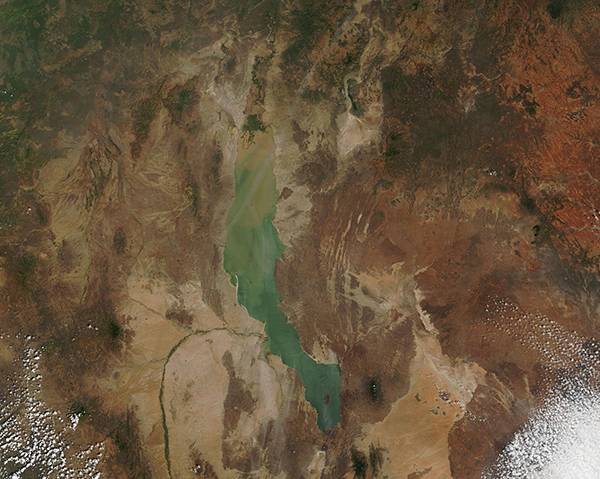Images
December 30, 2022 - Lake Turkana
Tweet
Sitting in the arid landscape of Africa’s Eastern Rift Valley, Lake Turkana is both the largest permanent desert lake and the largest alkaline lake on Earth. The long, narrow lake—it stretches 150 miles (250 km) from north to south and 27 miles (250 km) across—is located almost entirely in Kenya. At the northernmost tip, a delta is formed by the influx of the Omo River. This area, as well as the Omo River itself, belongs to Ethiopia.
The lake’s salty, alkaline water creates a unique ecosystem, where species have adapted to harsh conditions. Turkana contains about 50 different species of fish, with 11 species found only in this lake. It is home to the largest remaining population of the Nile crocodile and supports more than 350 native and migratory bird species.
Three rivers, the Turkwel, Kerio, and Omo, provide water to Lake Turkana, but Turkwel and Kerio are seasonal. The Omo River provides 90 percent of the inflow or about 19 billion cubic meters (671 cubic feet) of water each year. No rivers exit the lake, so the only outflow is by evaporation, which readily occurs in the hot, dry climate.
The Omo River not only provides water to Lake Turkana, but its waters are also used for hydroelectric power generation, and some are diverted for agriculture.
Currently, a new hydroelectric dam is under development in Ethiopia as part of an expanding system of power plants that should double the electricity output as well as increase industrial farming. The Gilgel Gibe III dam will likely have major impacts on Lake Turkana, the species that rely on the lake for life, and the people relying on the lake for their livelihoods.
The Moderate Resolution Imaging Spectroradiometer (MODIS) on board NASA’s Terra satellite acquired a true-color image of Lake Turkana on December 21, 2022. The Omo Delta is visible as a large dark area at the northern tip of the long, shallow lake.
Image Facts
Satellite:
Terra
Date Acquired: 12/21/2022
Resolutions:
1km (239.3 KB), 500m (630.3 KB), 250m (408.1 KB)
Bands Used: 1,4,3
Image Credit:
MODIS Land Rapid Response Team, NASA GSFC
Tweet
Sitting in the arid landscape of Africa’s Eastern Rift Valley, Lake Turkana is both the largest permanent desert lake and the largest alkaline lake on Earth. The long, narrow lake—it stretches 150 miles (250 km) from north to south and 27 miles (250 km) across—is located almost entirely in Kenya. At the northernmost tip, a delta is formed by the influx of the Omo River. This area, as well as the Omo River itself, belongs to Ethiopia.
The lake’s salty, alkaline water creates a unique ecosystem, where species have adapted to harsh conditions. Turkana contains about 50 different species of fish, with 11 species found only in this lake. It is home to the largest remaining population of the Nile crocodile and supports more than 350 native and migratory bird species.
Three rivers, the Turkwel, Kerio, and Omo, provide water to Lake Turkana, but Turkwel and Kerio are seasonal. The Omo River provides 90 percent of the inflow or about 19 billion cubic meters (671 cubic feet) of water each year. No rivers exit the lake, so the only outflow is by evaporation, which readily occurs in the hot, dry climate. The Omo River not only provides water to Lake Turkana, but its waters are also used for hydroelectric power generation, and some are diverted for agriculture.
Currently, a new hydroelectric dam is under development in Ethiopia as part of an expanding system of power plants that should double the electricity output as well as increase industrial farming. The Gilgel Gibe III dam will likely have major impacts on Lake Turkana, the species that rely on the lake for life, and the people relying on the lake for their livelihoods.
The Moderate Resolution Imaging Spectroradiometer (MODIS) on board NASA’s Terra satellite acquired a true-color image of Lake Turkana on December 21, 2022. The Omo Delta is visible as a large dark area at the northern tip of the long, shallow lake.
Image Facts
Satellite:
Terra
Date Acquired: 12/21/2022
Resolutions:
1km (239.3 KB), 500m (630.3 KB), 250m (408.1 KB)
Bands Used: 1,4,3
Image Credit:
MODIS Land Rapid Response Team, NASA GSFC




